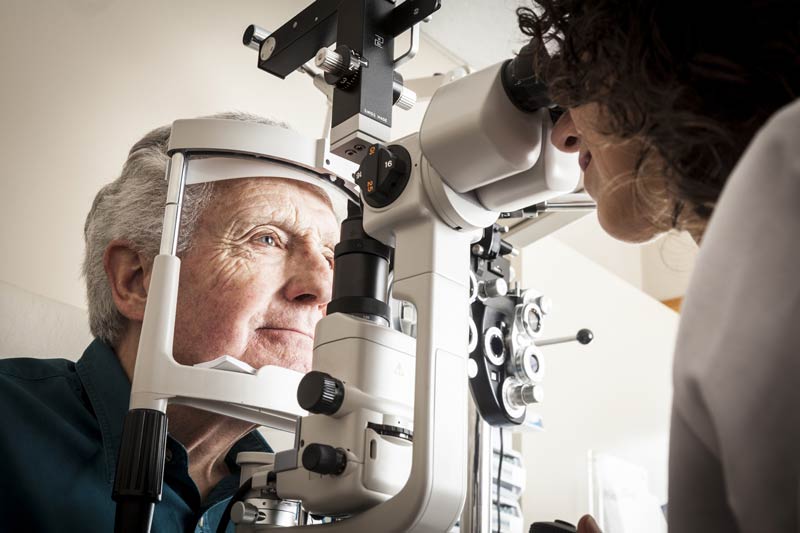
Learn about the two types of macular degeneration.
If your senior loved one has received a macular degeneration diagnosis, you’re likely to have a number of questions and concerns. And you’re not alone; a full 11 million Americans have received the same diagnosis, and that number is predicted to double by the year 2050. The Ames home care team at At-Home Care Company is here with the information you need to better understand this disease and how to best help your senior loved one.
What is macular degeneration?
Age-related macular degeneration (ARMD) is a disease in which the center of the retina (the macula) is damaged, impacting central vision and the details needed in reading, driving a car, watching TV, and recognizing faces. It is the number one cause of permanent central vision blindness in seniors, affecting 1 in 3 adults over age 75. It’s important to note that macular degeneration will not typically lead to total blindness; peripheral vision remains intact.
What are the two types of macular degeneration?
ARMD can manifest in two forms:
- Wet ARMD: Accounting for up to 20% of all diagnoses, wet age-related macular degeneration produces an accumulation of drusen – fat deposits – and an abnormality of the blood vessels under the retina. Both of these symptoms together lead to damage to the retina. Wet ARMD can progress quickly and result in severe and irreversible central vision loss.
- Dry ARMD: Dry ARMD makes up the majority (up to 90%) of macular degeneration diagnoses. As with wet ARMD, drusen develops beneath the retina, leading to a thinning of the macula and eventual loss of central vision. Progression is more gradual in this type of ARMD, but it can progress to wet ARMD.
In both forms of ARMD, early diagnosis and continued monitoring are crucial to protecting remaining vision.
How is ARMD diagnosed?
All seniors should receive eye exams at least annually. To detect ARMD, the eye doctor will dilate the eyes and perform a fundoscopy, fundus photography, and a visual acuity test. If ARMD is suspected, an additional test, a fluorescein angiography, will likely be needed. In this test, dye is injected to identify any leaks in the blood vessels. The Amsler grid eye test is a quick and easy tool that can also be used at home as a first step in determining if ARMD might be a possibility.
What treatment options are available for ARMD?
While there’s currently no cure for macular degeneration, there are several treatment options the doctor may want to try to halt the progression of the disease:
- Antioxidants and zinc
- Afibercept
- Ranzibizumab injections
- Pegaptanib sodium injections
- Photodynamic therapy
- Bevacizumab injections
- Vision rehab and low vision aids
Is it possible to prevent macular degeneration?
Making healthy lifestyle choices, such as quitting (or not starting) smoking, regularly exercising, following a healthy diet that includes plenty of vegetables, fruits, and fish, maintaining a healthy weight and normal blood pressure, and wearing eye protection when outdoors, such as sunglasses and hats, may help reduce the risk of developing ARMD.
For a trusted partner in care for a senior with macular degeneration to provide help with transportation, medication reminders, meal preparation, light housework, and much more, contact At-Home Care Company any time at 515-292-2650 to learn about the most trusted home health services in Des Moines, IA and the surrounding areas.
